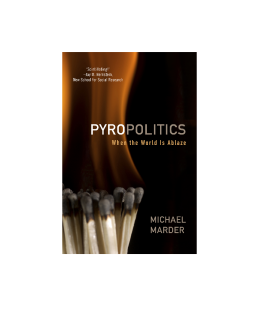
Additional Information
Book Details
Abstract
From the books and heretics burnt on the pyres of the Inquisition to self-immolations at protest rallies, from the massive burning of oil on the global scale to inflammatory speech, from the imagery of revolutionary sparks ready to ignite the spirits of the oppressed to car bombings in the Middle East, fire proves to be an indispensable element of the political.
To account for this elemental source of heat and light, Pyropolitics delineates a semantico-discursive field, replete with the literal and metaphorical mentions and uses of fires, flames, sparks, immolations, incinerations, and burning in political theory and practices. Relying on classical political theory, literature, theology, contemporary philosophy, and an analysis of current events, Michael Marder argues that geo-politics, or the politics of the Earth, has always had an unstable, at once shadowy and blinding, underside—pyropolitics, or the politics of fire. If this obscure double of geopolitics is, increasingly, dictating the rules of the game today, then it is crucial to learn to speak its language, to discern its manifestations, and to project where our world ablaze is heading.
Michael Marder is IKERBASQUE Research Professor in the Department of Philosophy at the University of the Basque Country , Spain. He is an editorial associate of the journal Telos and has written numerous books and articles on phenomenology, political philosophy and environmental thought. His recent book publications include Plant-Thinking, 2013, The Philosopher’s Plant, 2014and Phenomena-Critique-Logos, 2014.
This is a staggeringly original and provocative piece of writing. Many other adjectives could be applied – scintillating, dazzling, brilliant, illuminating, scorching, explosive, absolutely burning in its urgency-- but it’s hard to use any of these terms innocently any longer after reading this fascinating, lucid, rigorous meditation, which strikes to the heart of the contemporary epoch.
Rebecca Comay, Professor of Philosophy and Comparative Literature, University of Toronto
Scintillating!
Jay M. Bernstein, University Distinguished Professor, Department of Philosophy, New School for Social Research
This book was forged beyond the spectacles of empires, big and small, in a remarkable search for the meaning of being, of fire, and of the political in this most dangerous era of unstable climate and militaristic violence. Marder's profound reading of Carl Schmitt's political theology informs his deep political ontology for this era of 'the great blaze of global energy production and consumption.' His skepticism about a remaining 'choice between geopolitics and pyropolitics' drives a remarkable 'rethinking of the pyropolitical legacy.' Marder's excursion from Margaret Cavendish (1666) to Mario Cuomo (1984) leaves little doubt that the sun is setting on President Reagan's shining city on a hill. Marder worries over the power of empire's setting sun, as well he might, considering the political grip in the US of the neoliberal market myth with its blinding 'luminosity of contrived perfection.'. . . .The ashes of memory, rekindling the suffering of the defeated, may also rekindle the cosmic fire in whose light a global justice may appear for a political pluriverse rooted in peaceable economy and the knowledge commons. Summing Up: Recommended. Graduate and research collections.
In Pyropolitics: When the World is Ablaze, Michael Marder breaks the silence that envelops the atavistic and igneous element by proposing an original and compelling reinterpretation of the centrality of fire in our political and philosophical life … Through the ingenious pyropolitical lenses offered by this book, global politics becomes what one might call theoretical pointillism, the most appropriate graphic metaphor to describe the distinctive types of violence that characterize our age, from the recent attacks in Paris to the targeted killings carried out by the Obama administration.
With this subtle, smart, and well-documented book, Michael Marder authoritatively weighs in on an old discussion about the role that fundamental elements (water, air, earth, fire) play in the construction and destruction of societies. This is a brilliant contribution to political metaphorology, useful for understanding the logic behind the combustible world in which we live.
Daniel Innerarity, Director of Globernance: Institute for Democratic Governance, San Sebastián, Spain
